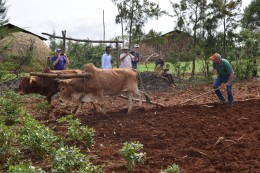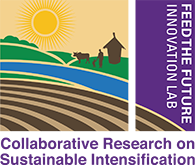 The sustainable intensification of agriculture offers smallholder farmers huge opportunities in the Amhara region of Ethiopia, according to the participants of a workshop on appropriate scale mechanization at Bahir Dar University on the June 8-9, 2016. The introduction of locally-adapted technologies has the potential to raise incomes and nutritional security, reduce drudgery and empower women and youth, offering the people of the region sustainable alternatives to migration to larger urban areas of the country, principally Addis Ababa.
The sustainable intensification of agriculture offers smallholder farmers huge opportunities in the Amhara region of Ethiopia, according to the participants of a workshop on appropriate scale mechanization at Bahir Dar University on the June 8-9, 2016. The introduction of locally-adapted technologies has the potential to raise incomes and nutritional security, reduce drudgery and empower women and youth, offering the people of the region sustainable alternatives to migration to larger urban areas of the country, principally Addis Ababa.
The event was organized by the Appropriate Scale Mechanization Consortium, a $4.7 million four-year project, which is part of the Sustainable Intensification Innovation Lab (SIIL), an initiative of Feed the Future led by the United States Agency for International Development. The consortium component of SIIL, which began in September 2015, seeks to leverage the use of mechanization to improve farm productivity, income and nutrition of smallholder farmers, particularly women, in Bangladesh, Burkina Faso, Cambodia and Ethiopia.
Opening the event, Baylie Damtie, the president of Bahir Dar University, underlined the importance of agriculture in the sustainable development of Ethiopia, the key to the industrialization of the country. He also emphasized, however, that this process needed to be introduced at a pace suitable to the needs of the country. Job creation is key, he said.
Challenges/opportunities
In a number of breakout sessions, participants—including members of U.S. and Ethiopia universities and research institutes, nongovernmental organizations (NGOs), government extension workers and local farmers—highlighted the myriad of difficulties faced by farmers in raising agricultural productivity, including: access to storage facilities for crops to prevent spoilage; water for irrigation; small loans; training on best practices; and appropriate transportation to markets, as well as difficulties in preparing land for planting crops.
Rising demand for food, due to population and economic growth, requires the use of more efficient methods of food processing and preservation, as well as the enhanced production of improved animal feeds and forages. The introduction of simple and locally-adapted mechanization offers the key to freeing up labor resources. The availability of small loans and grants through farmer cooperatives would open doors for women and young people to use new technologies, both directly in the agricultural sector as well as along the food value chain.
Capacity development/outreach
Developing technologies, however, is not an end in itself. Much of the consortium work will focus on how to build local capacity to ensure the sustainable implementation of new and adapted technologies. The consortium will explore the possibility of supporting additional opportunities in undergraduate research and student internships in Ethiopia, as well as the provision of short-term training at international locations, for instance at third-level institutes in India. The consortium also plans to fund three master’s and three doctorate level students in Ethiopia and assist others to obtain funding to study in the U.S. Other short-term courses will be developed on topics such as systems thinking, cropping systems, appropriate-scale mechanization, sustainability, etc. and made available at Bahir Dar University and online.
In collaboration with Tillers International, an NGO dedicated to the development and adaption of farming equipment, the consortium also plans to make hub facilities available to reach out to farmers, particularly women, farmer organizations, government extension staff and young people. Based on identified local needs, consortium partners will work with farmers to build, refine and repair tools, and offer farmers an opportunity to participate in field schools, centers of excellence and demonstration plots. Farmers will attend train-the-trainers courses, and opportunities for farmer-to-farmer learning will also be facilitated. The key to the success of the approach will be the successful provision of skills to local people in the construction of equipment with locally available materials.
Other approaches
The consortium will also look at the introduction of more refined approaches to value-chain development, proposed by Frédéric Baudron of the International Maize and Wheat Improvement Center in Ethiopia. According to Baudron, yield-improving technologies are well known, but their application generally increases the demand for farm power. Studies have shown, he said, that the introduction of locally manufactured machinery can substantially increase agricultural productivity. Rather than thinking of each farmer owning his or her own machinery, however, the development of local service providers may be more efficient.
Finally, Manny Reyes of North Carolina Agricultural and Technical State University, presented an innovative approach designed to eliminate the drudgery of tillers all together. Despite the importance of smallholder farmers to the production of food globally, little research is dedicated to their needs. By adopting a minimal soil disturbance (no-tillage), continuous application of mulch and diverse species (MCD) approach, soil quality and yields will be improved and a huge number of labor hours will be freed up for farmers to engage in other productive activities.


